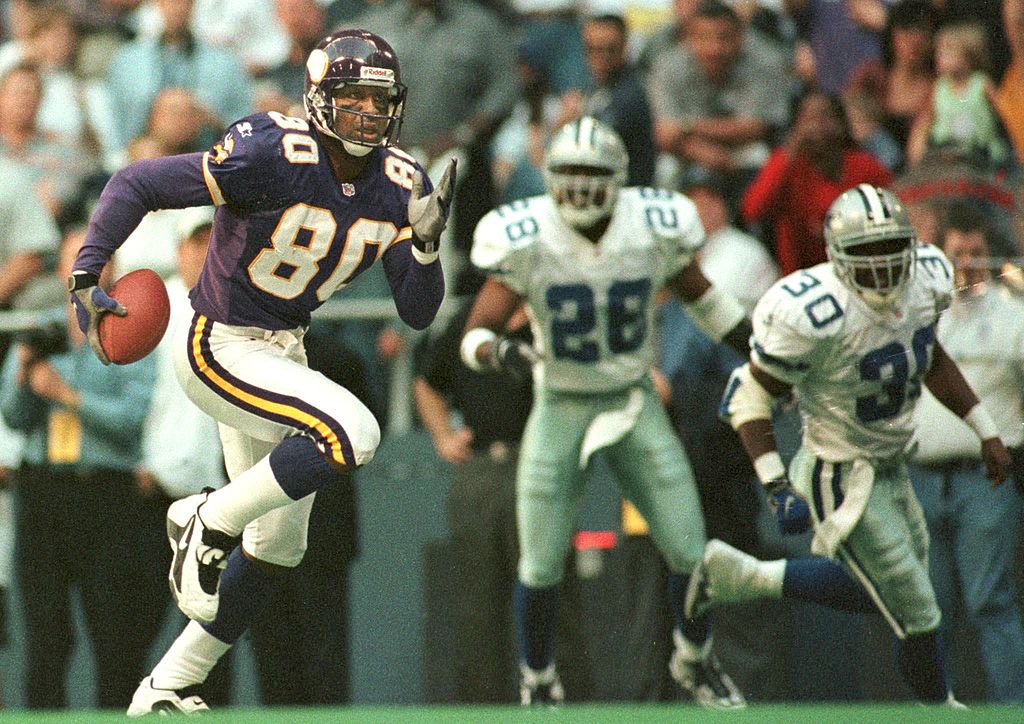NFL
Cris Carter Relates to Tough Times, Gives Back During Pandemic

Cris Carter was one of six kids growing up in a single-parent household so he understands what it’s like to have to go without. Poverty, however, helped shape Carter into the man he’s become. He’s a family man, still very close to his brothers and sisters. Carter, a Hall-of-Fame wide receiver with the Minnesota Vikings, can relate to what people are going through today with the global spread of the coronavirus (COVID-19). Carter is now helping support Project Isaiah, a charitable organization that provides free, boxed meals to people in need and keep food-service workers employed during the pandemic.
Cris Carter’s Hall-of-Fame career
RELATED: Shaquille O’Neal’s Generosity Shown Again as He Pays For Funeral of Young Boy Killed in Car Crash
It wasn’t easy, but Cris Carter finally made it to the pinnacle of the NFL. In 2013, Carter heard his name called and was inducted into the Pro Football Hall of Fame. Carter spent 16 years in the NFL and went through some tough times, just as he did while growing up. In fact, just getting to the NFL was a chore for Carter.
Prior to his senior year at Ohio State University, Carter had signed with an agent and that ruled him ineligible for his final year. Carter was selected in the fourth round of the 1987 NFL supplemental draft by the Philadelphia Eagles, where he struggled early. He caught five passes in his rookie season before turning it up in 1988, starting all 16 games and catching 39 passes. Carter and coach Buddy Ryan clashed, mainly because of Carter’s alcohol and drug abuse, according to an article in bleedinggreennation.com.
Carter was released and hooked on with the Minnesota Vikings, where he spent 12 seasons and scored 110 touchdowns. He finished his Vikings career with 12,383 receiving yards. With the Vikings, he made the Pro Bowl eight straight seasons from 1993-2000. When he left the team to play one year with the Miami Dolphins, he was the Vikings’ all-time leader in receptions, yardage, and touchdowns.
Carter patiently waited his turn for the HOF
In 2008, Cris Carter was a finalist to be inducted into the Pro Football Hall of Fame. He had his family with him and everyone was geared up for him to be a Hall of Famer. When his name wasn’t called, Carter was OK. It was another bump in the road. He still had his family with him.
“You know how you hear people say that they had people in their lives who told them they couldn’t make it or they couldn’t do something?” Carter told ESPN in 2008. “That’s not me. That’s not my story. My brothers have been there with me since day one. We’ve been through everything together — good and bad. Don’t get me wrong, I would love to be voted into the Hall of Fame. But if I don’t get in, that’s not the end of the world. I am surrounded by my loved ones, and being with them, going through this journey with them, makes me extremely happy.”
His family stayed with him year after year after year until they heard his name called in 2013. Like they were when they were growing up without money and very little food, they stuck together. “After all we’ve been through, to be here, having my name considered for the Hall … I am just so grateful. I can’t think of anything better right now,” Carter said.
Cris Carter happy to give back
Cris Carter made a very healthy living during his NFL career. He remembers where it all started. He remembers the tough times growing up and now he sees others struggling financially due to COVID-19. Carter decided he wanted to give back because he knows what it’s like to go without food. That’s the reason he decided to help with Project Isaiah.
“It touches me personally because I don’t know what my family would have done 30, 40 years ago if there had been a pandemic,” Carter said in USA Today. “If I was a young kid sitting around all day and my mom couldn’t go to work and we couldn’t go to school, it would have been tough. I was going to school for at least two of my meals.”
Since April, Project Isaiah has provided more than 1.7 million meals in 11 cities that have been hit hard by COVID-19. “You have people who have struggled but have been doing it the right way trying to dig out of poverty,” Carter said. “Then something like this happens, it can throw them right back into poverty. Why wouldn’t we care? People need support.”











